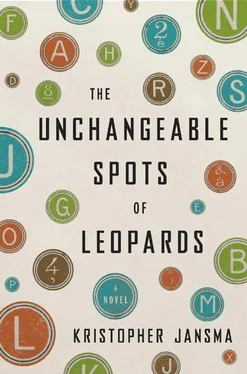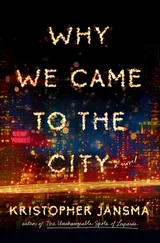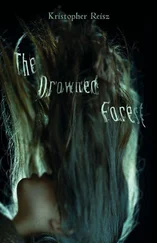In the morning I accidentally woke Shelly as I was reaching my free arm into my backpack on the floor, trying to fish out Julian’s story.
“Sorry,” I said, “I just can’t wait to tear this thing apart. What kind of a title is this? He must have written this an hour before class. It’s not even three pages long.”
But as Shelly settled back to sleep on a dark waterfall of her own hair, I began to read Julian’s story and was soon astounded to find it utterly untearable. Though “The Thirty-Third Winter” was only two and a half pages, it felt epic. It was about a man skinning a hare out on the moors of Ireland while drinking from a bottle of Epiphany whiskey. I’d never read anything better. It made me so deeply ashamed of my own story that I wanted a stiff glass of Epiphany myself. Impossibly, Julian appeared to know more about being thirty-three and skinning hares in Ireland than I did about cleaning restaurant tables and growing up in the American South, which I had actually done.
I left Shelly’s room that morning in a solemn autumn funk, which lingered all through the weekend. It persisted even when, in our next class, Professor Morrissey praised my monstrous story for its fine detail. It wasn’t until Julian spoke up that I felt any better.
“It feels classic but at the same time strangely modern. Like Bach played on an electric violin.”
I had no idea what to make of this, but it was the most he’d ever said at once in our class, so I took it as a double-underlined compliment. He said nothing at all about Shelly’s piece, “If We Were Birds,” a gruesome melodrama about a married couple who accidentally kill their newborn baby when a bout of their depraved sex breaks the crib to splinters. I said I liked that there were yellow squids on the nursery wallpaper and that this might be symbolic of something, though what I couldn’t decide. She still didn’t seem very happy.
When we finally got to Julian’s story, Professor Morrissey praised it effusively, as did I, as did all the girls except Shelly. Morrissey talked for ten minutes alone about one description of a rock covered in lichen, and by the end I’d have believed that the secrets of the entire universe were contained in that rock. But Julian didn’t say a thing. He didn’t write down our comments. He didn’t even smile.
My first real conversation with Julian didn’t occur until a month later, in mid-November, when Professor Morrissey invited “a dear friend and old classmate” of his, a writer named Jan Sokol, to come in as a guest lecturer. For homework, we had all read his story “The Minimum Wage.” I’d thought it was pretty awful until I realized that it had been published in the New Yorker . I decided I must be missing something, probably because I didn’t know anything about Czech revolutionaries, which it seemed to be about. Sort of.
Sokol, like Morrissey, was in his nebulous forties. Plump and baby faced, with wiry sprays of dark hair, the writer slumped over the edge of the table as he spoke. From my seat near the front, I breathed in the stench of cheap vodka. I checked the time on my wristwatch, even though I knew that our class met at 8:30 in the morning. Sokol leered at several of the girls along the left side of the table as Morrissey introduced him. They seemed utterly repulsed, but I couldn’t help but notice that Shelly was staring at him with curiously wide eyes.
“The university has invited Jan to do a reading here during alumni weekend. And the dean has asked me to hold a contest. The student who submits the best story will read it in front of a gathering of alumni and students in December.”
“That’s the first thing to know about being a writer,” Sokol interrupted in a squeaky, nasal voice. “Nobody actually wants to read anything themselves. They all just want you to read it to them.” This sounded like a joke, though he sounded utterly miserable as he said it. His eyes flitted to my photocopy of his story, which I had out in front of me. Slowly he reached over and grabbed it in a pudgy hand.
“Pinkerton,” he said absently, “may I borrow this?”
I was about to say that my name wasn’t Pinkerton when Sokol rose up out of his seat and studied my photocopy for a moment at arm’s length. His face took on a look of abject desperation.
“For the love of whatever gods you believe in,” he pleaded, “don’t be writers.”
We all looked to Morrissey while this plea echoed through the classroom. Our professor appeared only mildly alarmed. It wasn’t clear if Sokol had anything else to add, but then suddenly he continued.
“You might as well walk across the desert planting apple seeds. Be doctors. Or, if you’re not smart enough to be a doctor, be a security guard. That’s what I do. We make pretty good money. And don’t worry about getting hurt. The chances are ten billion to one that anyone is going to blow up the building you’re in. I guard the Las Olindas Mormon Tabernacle, five nights a week. The worst that happens is that kids come and try to piss on it, and then I get to zap them with a taser. But most nights it’s quiet. Sometimes I just dance down the hall like it’s the darkest nightclub in Warsaw. I get drunk. Later I zap myself, just to see if I can feel it. Or I’ll call a girl over. That’s the real ticket. Happiness! Happiness is making love for as long as you can stand it to the most luminous thing you can find on this rotten corpse of a planet!”
He punctuated this last point by slamming his fist on the table, spilling coffees and scattering pens all along its length. None of us breathed. Even Julian was absolutely alert. I was so sure that it was all simply preamble to some sort of inspirational speech, about how, really, writing was the only thing worth doing at all. But instead he lifted up the copy of his story that he’d taken from me and tore it in two.
“There are enough books in the world,” he concluded mournfully. Then he sat down again, placed his head on the edge of the table, and began to weep. For a few long moments, we all just listened to this gigantic man, sobbing over the chaotic clanking of the radiators.
“Class dismissed,” Professor Morrissey said finally, when it became clear these were not tactical tears. “Boys, would you help me get him to my office?”
The girls erupted into frantic whispers as they grabbed their notebooks and fled, nervously looking over their shoulders to confirm that the man was still there, crying. Only Shelly lingered for a few moments, watching Sokol’s tears soak into a pile of our papers before she skittered away.
Morrissey got the door, while Julian and I got underneath each of the man’s arms, yokelike and heavy, and eased him out of the room and into the hallway.
“Is he going to be all right?” I asked.
“Random House turned down his novel this morning,” Morrissey explained. “He’s been writing it since we met eighteen years ago. I told him to just come in some other time, but he was insistent.”
Eighteen years was longer than I’d been alive. For the first time I began to wonder if this writing thing wasn’t maybe a bad idea. True, Betsy had told me to write her something. The nights I’d spent writing that story, getting lost in my imaginary Durham, were the closest I’d come to reliving that night. Pretending in her presence. Making myself up. But now that the story was finished, it didn’t seem like hardly enough. I felt sure that I could do better, that I could say more. As I helped to carry the weeping Sokol through the hallowed halls of Berkshire College, I could not help but wonder if this was where it all led.
Julian and I got Sokol at last into Morrissey’s tiny office, where he knocked into piles of dusty books and student papers before finally collapsing into an armchair.
Читать дальше











